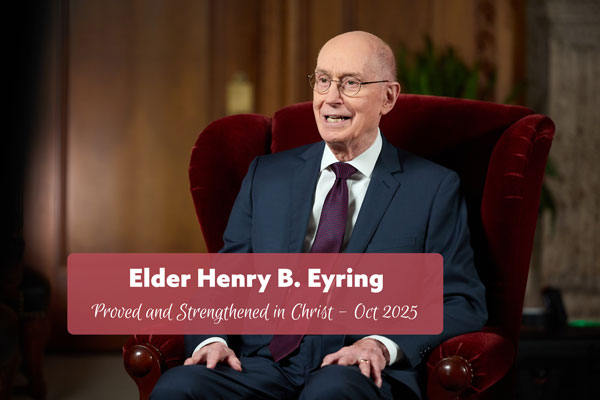Lesson Plans Put Together by a Prayerful Human
Exceptional General Conference Quotes Plus Discussion-Promoting Questions
Elder Eyring covered how the Lord proves us and strengthens us, the heroic story of Moroni and others, the empathy and understanding of Jesus Christ, and where we get our strength.
Useful Links
- Tips for delivering a successful lesson are located at the end of the article.
- For other speakers, see General Conference Talks with 5 Highlights
- For printable copies of this lesson – click here.
All blue quotes are from Henry B. Eyring’s October 2025 General Conference talk (unless otherwise noted).
Quote #1 (story)
Elder Eyring’s opening story makes a great introduction to the rest of the lesson.
Possible engagement tool: Divide the story up between four readers for emphasis and better engagement.
Long ago I sought to learn physics and mathematics in my college years. I felt overwhelmed. I began to feel that I was trying to learn something that was beyond me. The more I felt overwhelmed, the less I felt the strength to keep trying. My discouragement led me to feel that my efforts were almost fruitless. I began to think of quitting, of doing something easier.
I felt weak. As I prayed, I felt the quiet assurance of the Lord. I felt Him say to my mind, “I am proving you, but I am also with you.”
I did not know then all that those words meant. But I knew what to do—I went to work.

I learned that my struggle with physics was actually a gift from the Lord. He was teaching me that with His help, I could do things that seemed impossible if I had the faith that He would be there to help me. Through this gift, the Lord was working to prove and strengthen me.
Possible discussion questions: By show of hands, have you ever been in a situation where you felt inadequate and prayed for strength? Does anyone have a story they would like to share?
Possible enrichment activity: Ask 1-3 people to read over Elder Eyring’s school story on their own and then share a SHORT story with the class about a time when they were proven and strengthened. Ask them to keep the story under 3 minutes.
For printable copies of this lesson – click here.
Quote #2 (prove)
Possible engagement tool: Since Elder Eyring is a “teach by stories” and tends to have longer (but effective) explanations, I would divide up the reading to keep attention at a maximum.
The word prove has several meanings. To prove something is not simply to test it. It is to increase its strength. To prove a piece of steel is to place it under strain. Heat, weight, and pressure are added until its true nature is enhanced and revealed. The steel is not weakened by the proving. In fact, it becomes something that can be trusted, something strong enough to bear greater burdens.
The Lord proves us in much the same way to strengthen us. That proving does not come in moments of ease or comfort. It comes in moments when we feel stretched beyond what we thought we could bear.
—AND—
‘Essential to God’s great plan for the mortal growth of His children was for them to experience “opposition in all things.” Just as our physical muscles cannot be developed or maintained without straining against the law of gravity, so mortal growth requires us to strain against Satan’s temptations and other mortal opposition. Most important for spiritual growth is the requirement to choose between good and evil. Those who choose good would progress toward their eternal destiny. Those who choose evil—as all would do in the various temptations of mortality—would need saving help, which a loving God designed to provide.’ (President Oaks, Divine Helps for Mortality, April 2025)
Possible discussion questions: Why is opposition necessary, and what would happen to our strength and growth if we didn’t run into opposition? What stands out to you from either of these quotes—what thoughts came up for you as we read these? If someone tries to make you feel less favored or less blessed because you run into hard times, what could you teach that person?
Quote #3 (moroni)
Elder Eyring chose three scripture heroes as examples: Moroni, Jacob, and Joseph Smith. You can use any one of the three or more if you have time—I chose Moroni because his particular situation at the end was just amazingly awful. I thought Elder Eyring illustrated the point best with his comments on Moroni.

Possible engagement tool: Have four different people each read a paragraph of this story.
When we continue to have faith in Jesus Christ—even when things might feel impossible to us at the moment—we become spiritually stronger. The sacred scriptural records emphasize this truth.
The prophet Moroni, for instance, was proved and strengthened in such a way. He lived his final years alone. He wrote that he had no friends, that his father had been killed, that his people had been destroyed. He was hunted by those who sought his life.
Yet Moroni did not despair. Instead, he engraved his testimony of Jesus Christ on plates for people he would not live to see, including the descendants of the people who desired to kill him. He wrote for us.
Moroni’s testimony was refined in loneliness, but it shines with light to guide all generations to seek our Father in Heaven and the Savior Jesus Christ.
Possible discussion questions: Few of us have experienced situations as hard as Moroni’s—if you could have a conversation with Moroni today, what would you say to him? (Accept all reasonable answers! – We would probably thank him for being so faithful and for his part in the Book of Mormon too.) Is it possible to be strong, favored, and greatly loved by the Lord and still have very tough situations to work through—can both of those be true at the same time? What are some scripture and Church History examples of those who have suffered while being faithful? How do you feel when you read or hear their stories? Have you ever had a painful trial that strengthened you and helped you develop some part of your character?
Quote #4 (christ)
Possible engagement tool: Have your class ponder a bit about why it’s possible for Jesus to intimately understand what we’re going through as you read the following quote.
Because of His glorious Atonement, Jesus Christ can strengthen us in our times of trial. He knows how to succor us because He has felt all the challenges that we will ever feel in mortality. “He will take upon him the pains and the sicknesses of his people … that he may know according to the flesh how to succor his people according to their infirmities.”
We learn that while in the Garden of Gethsemane, the Savior did ask the Father if the trial could pass over Him—but then He also said that if it was the Father’s will, then the Savior would do it. In other words, the Savior even took on doubt and uncertainty, but He had faith in His Heavenly Father.
Possible discussion questions: How do you feel about Jesus Christ being able to empathize with everything you go through? How does it feel to be understood? Have you ever experienced a tender mercy, that small little blessing that showed you God saw you and considered you?
Quote #5 (strength)
This is a perfect closing statement for this lesson if you have time.
Brothers and sisters, your proving and strengthening may not look like Moroni’s…But it will come. It may come quietly, through the trials of family life. It may come through illness or disappointment or grief or loneliness.
I bear witness that these moments are not evidence that the Lord has abandoned you. Rather, they are evidence that He loves you enough to refine and strengthen you. He is making you strong enough to carry the weight of eternal life.
Summary
Summarize class discussion highlights and/or share your testimony and feelings about Elder Eyring’s talk. Thank your class for their excellent contributions and insights.
Final Comment
Please teach the quotes in any order that makes sense to you.
Teach with confidence, and if you would like some tips on how to feel more confident while teaching – try “9 Tips for More Class Participation.” May the Spirit bless and guide your efforts.
(You can find the full General Conference talk here.)
How to Teach Successfully and Give a Better Lesson
You have great content; now let’s ensure the lesson goes smoothly.
Unless you opt to spend a lot of time on a particular quote, try to pick around 2 questions per quote. Prayerfully select the questions that resonate the most with you and would make a meaningful discussion for your group of personalities.
The above “5 Highlights” quotes and discussion questions fit with Lesson Template 1 —OR— Lesson Template 2.
Lesson Prep
- You can arrange the quotes in any order that makes sense to you. I suggest starting with the most important ones and working your way down. Don’t EVER worry about covering all the quotes. Rushed lessons are not as effective.
- If you want the discussion to be more robust and meaningful, hand out reading assignments ahead of time and ask the reader to answer one question about them (i.e. pick one of the questions from each quote and give it to them, along with the assigned quote). The sooner you do this, the better, but if possible, at least show it to them before the Sacrament meeting. You can also send it via text or email.
- Ask various people to read and participate, especially those who are not often asked to do so.
Lesson Delivery
- Ensure every class member has the conference talk and scriptures in front of them or on their phone. Always invite the class to read along—hearing and seeing the words together increases comprehension and engagement.
- Avoid videos – they shut down discussion. Save them for personal study.
- If the discussion gets too non-spiritual, pull it back by going to the next quote or question.
- Make sure you assign others to read the quotes. You’re talking enough already, and letting others read allows more people to participate.
- Encourage discussion by accepting all reasonable answers. Validate people for participating, and be thankful they spoke up. Engage with the answer in a conversational way whenever it feels natural. Never say, “That’s not the right answer.”
- Remember, spiritual discussion is golden. We want people to talk about the gospel together.
- Never say, “We haven’t got to that part of the lesson yet.” If the discussion takes a different turn than your planned lesson, roll with it. The Spirit intends for you to be successful.
0 Comments